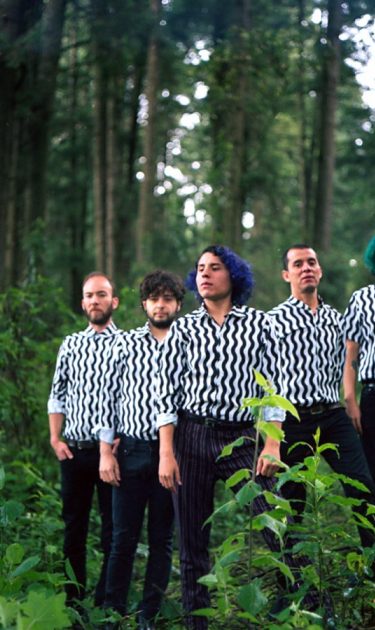Tijuana is without question one of Mexico’s most prolific music hubs, thanks to its history of intersecting traditional music, youth culture, and a constant stream of influences filtering through the city’s border with the U.S. The latest name to reflect that blend and emerge from Tijuana’s buzzy musical landscape is Ramona, a five-piece indie rock band drawing from psychedelia and pop to transport listeners away from their troubles and into stupors of colorful euphoria.
In a new interview with Remezcla, Ramona frontman and guitarist Jesús Guerrero describes their latest effort Párpados as “an album to travel, perfect for long walks or a chill drive.” On top of its beautiful psychedelic escapism, the sound of Ramona’s third album is lightyears ahead of their first, 2015’s La Segunda Luz del Día, as the band settles into their musical language and breaks free of conventional song structures. Their new video, “Es Difícil Volar,” which premieres on Remezcla today, also reflects the album’s overarching theme as a reaction to the band’s relocation from Tijuana to Mexico City and the search for a moment of peace and levitation in their hectic new home.
Our conversation with Guerrero also touches on why the band refuses to be defined by their hometown, how Carla Morrison played an integral role in launching their careers, and why Argentina might be the next big landmark on Ramona’s horizon.
Watch the video for “Es Difícil Volar” below:

Tell us about the band’s early days. How was Ramona formed?
Our drummer Omar [Córdoba] and I are the band’s core members, and we always knew we wanted to craft our own songs. We started jamming and getting our songs together, rounded out the roster with new bandmates that didn’t stay long, and went in the studio to record our first album, La Segunda Luz del Día. That was our initial direction and we named the band Ramona because of Ramona Flowers of Scott Pilgrim vs. The World and [Norteño legend] Ramón Ayala. I feel like a lot of bands had English names when we started in 2012, and we weren’t really into that because even though Tijuana is on the border, most people listen to music in Spanish. When someone said Ramón Ayala, I was all in.
What was your experience coming up in a scene as vibrant as Tijuana’s?
We’re all friends back in Tijuana. We record in each other’s homes, lend each other instruments. Rommel [Santellanes], the singer for Entre Desiertos, has a home studio where we all often meet and hang out. A lot of U.S. bands cross the border and perform in Tijuana, so we’re also lucky to have a constant flow of talent. We’ve definitely tried to transcend our hometown’s reputation but Mexico City is another world where a lot of people have no idea about what’s happening in Tijuana.
“We’ve definitely tried to transcend our hometown’s reputation but Mexico City is another world where a lot of people have no idea about what’s happening in Tijuana.”
There is a certain legend about how Carla Morrison discovered you guys and helped with the production, financing, and release of your first album, La Segunda Luz del Día. Can you share that story with us?
We met Carla through a friend named Alejandro Jimenez, who was our producer during the first album cycle and played her one of our demos, which she really liked. She was already planning on setting up a production company to help artists finance an entire album, complete with music videos, recording, mixing and mastering. And that’s what happened. The company is called Pan Dulce Productions and we’re very grateful they helped us record the album we had envisioned, which led to new audiences and bookings all over. She was very open about the help she received on her way up and this company is a way for her to give back.
That first album has a more traditional indie rock sound, whereas your new record Párpados is a deep dive into psychedelia. Can you describe your sonic evolution over the last three years, leading up to this new era?
I’m 21 years old now and we recorded that first album when I was 15, so we’ve grown up and listened to a lot of music along the way. [Párpados] is comprised of eight songs and we wanted to present something completely different from our past work while working with friends and doing what we love. We recorded many instrumentals with Seiji and Kenji Hino of the band Sierra León, who produced our last album Cérès, but this record was produced by us, sitting at home, playing with sounds and tweaking things as we went. We were listening to a lot of King Gizzard, Boogarins, and Gaspar Peralta to get in the psych mindset. We’re also influenced by a lot of musicians coming out of Argentina, like Luca Bocci, Perras On The Beach, and Gustavo Santaolalla. We’re really attracted to music that transports you and that’s what we were looking to achieve here.
We’re also premiering your new video today. What can you tell us about “Es Difícil Volar”?
Fernanda Villalba and César Ortiz of Somos/Simios directed the video, which we recorded on a rooftop here in Mexico City. Our concept for [“Es Difícil Volar”] was the idea of escaping the mayhem of big city life – traffic, people screaming on the metro, crowds on the street, and finding a moment of peace. That is also a general theme of the album – how even though we’ve lived in Mexico City for three years, we still haven’t gotten used to the chaos.
You were in Argentina earlier this year and you might be spending more time there in the future. What led you to Argentina and what does the future hold for Ramona?
We once played a gig in Guadalajara where we met a producer named Tweety González, who played keyboard in Soda Stéreo. He really enjoyed our music and invited us to Argentina, leaving open the possibility of recording an album with him down the line. In January, we went down and played shows in Buenos Aires, La Plata, and Mendoza, showed him some of the newer songs we’ve been working on, and if everything goes well, we’ll be back next year to work on the album. Also, lots of fans in Colombia, Argentina, and Peru have been reaching out, so we’re definitely eager to return to South America as soon as possible.
Ramona’s Párpados drops on October 12.




